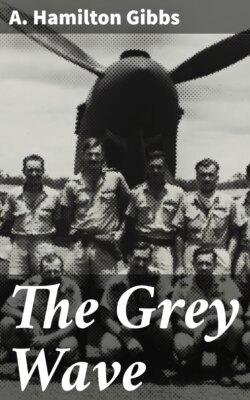Читать книгу The Grey Wave - A. Hamilton Gibbs - Страница 17
12
ОглавлениеShall I ever forget that week-end, with all its strength of emotions running the gamut from exaltation to blank despair and back again to the wildest enthusiasm?
We paraded at the Quartermaster’s stores and received each a kit bag, two identity discs—the subject of many gruesome comments—a jack-knife, mess tin, water bottle, haversack, and underclothes. Thus were we prepared for the killing.
Then the Major appeared and we fell in before him.
“Now which of you men want to go to the front?” said he. “Any man who wants to, take one pace forward.”
As one man the whole lot of us, about thirty, took one pace forward.
The Major smiled. “Good,” said he. “Any man not want to go—prove.”
No man proved.
“Well, look here,” said the Major, “I hate to disappoint anybody but only twenty-eight of you can go. You’ll have to draw lots.”
Accordingly bits of paper were put into a hat, thirty scraps of paper, two of them marked with crosses. Was it a sort of inverted omen that the two who drew the crosses would never find themselves under little mounds in France?
We drew in turn, excitement running high as paper after paper came out blank. My heart kicked within me. How I prayed not to draw a cross. But I did!
Speechless with despair the other man who drew a cross and I received the good-natured chaff of the rest.
I saw them going out, to leave this accursed place of boredom and make-believe, for the real thing, the thing for which we had slaved and sweated and suffered. We two were to be left. We weren’t to go on sharing the luck with these excellent fellows united to us by the bonds of fellow-striving, whom we knew in sickness and health, drunk and sober.
We had to remain behind, eating our hearts out to wait for the next draft—a lot of men whom we did not know, strangers with their own jokes and habits—possibly a fortnight of hanging about. The day was a Friday and our pals were supposed to be going at any moment. The other unlucky man and myself came to the conclusion that consolation might be found in a long week-end leave and that if we struck while the iron of sympathy was hot the Major might be inclined to lend a friendly ear. This indeed he did and within an hour we were in the London train on that gloomy Friday morning, free as any civilian till midnight of the following Tuesday. Thus the Major’s generosity. The only proviso was that we had both to leave telegraphic addresses in case——
But in spite of that glorious week-end in front of us, we refused to be consoled, yet, and insisted on telling the other occupants of the carriage of our rotten luck. We revelled in gloom and extraneous sympathy until Waterloo showed up in the murk ahead. Then I’m bound to confess my own mental barometer went up with a jump and I said good-bye to my fellow lancer, who was off to pursue the light o’ love in Stepney, with an impromptu Te Deum in my heart.
My brother, with whom I spent all my week-ends in those days, had a house just off the Park. He put in his time looking like a rather tired admiral, most of whose nights were passed looking for Zeppelins and yearning for them to come within range of his beloved “bundooks” which were in the neighbourhood of the Admiralty. Thither I went at full speed in a taxi—they still existed in those days—and proceeded to wallow in a hot bath, borrowing my brother’s bath salts (or were they his wife’s?), clean “undies” and hair juice with a liberal hand. It was a comic sight to see us out together in the crowded London streets, he all over gold lace, me just a Tommy with a cheap swagger stick under my arm. Subalterns, new to the game, saluted him punctiliously. I saluted them. And when we met generals or a real admiral we both saluted together. The next afternoon, Saturday, at tea time a telegram came. We were deep in armchairs in front of a gorgeous fire, with muffins sitting in the hearth and softly shaded electric lights throwing a glow over pictures and backs of books and the piano which, after the barrack room, made us as near heaven as I’ve ever been. The telegram was for me, signed by the Adjutant.
“Return immediately.”
It was the echo of a far-off boot and saddle.—I took another look round the room. Should I ever see it again? My brother’s eye met mine and we rose together.
“Well, I must be getting along,” said I. “Cheero, old son.”
“I’ll come with you to the station,” said he.
I shook my head. “No, please don’t bother.—Don’t forget to write.”
“Rather not.—Good luck, old man.”
“Thanks.”
We went down to his front door. I put on my bandolier and picked up my haversack.
“Well—so long.”
We shook hands.
“God bless you.”
I think we said it together and then the door closed softly behind me.
Partir, c’est mourir un peu.—Un peu.—God!
